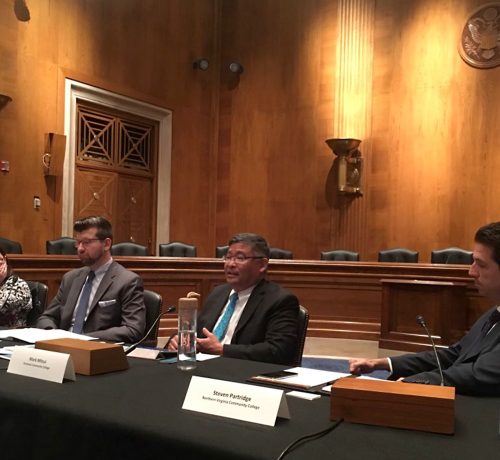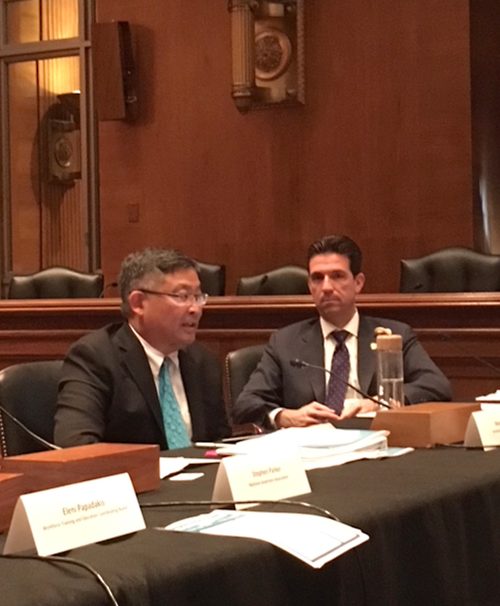This content was published: June 28, 2018. Phone numbers, email addresses, and other information may have changed.
Mark Mitsui talks CTE, future Perkins funding in front of US Senate caucus
Photos and Story by James Hill
On Thursday, June 28, Portland Community College President Mark Mitsui spoke on a panel called “Advancing Quality Work-based Learning” in front of the Senate Career and Technical Education Caucus in Washington, D.C. Mitsui talked about the CTE successes at PCC and the importance of reauthorizing the budget for the Carl D. Perkins Career and Technical Education Act.
Held in the Dirksen Office Building, the caucus is co-chaired by Sen. Tim Kaine (D-VA), Sen. Rob Portman (R-OH), Sen. Todd Young (R-IN) and Sen. Tammy Baldwin (D-WI). Their aim is to call attention to CTE as a proven method for promoting the country’s continued economic growth and ensure that students have the skills they need to succeed.
Mitsui highlighted how the college and the state of Oregon is increasing CTE certificate completion and facilitating stronger wages locally. He told the senators that PCC has more than 1,600 employer partners that advise on curriculum, training practices and job skills to meet industry needs.
“Thanks to the partnership between PCC and employers, we offer many work-based learning opportunities like apprenticeships and internships, as well as co-operative education agreements,” Mitsui stated.
He went on to highlight successful first-of-its-kind apprenticeship partnership with Madden Industrial Craftsmen, as well as how the college is the education and training lead for the Oregon Manufacturing Innovation Center (OMIC) consortium. OMIC and PCC recently earned more than $300,000 worth of grant funding to expand and enhance regional apprenticeship opportunities throughout the area. The largest, a $247,512 Oregon Employment Department Apprenticeships in Manufacturing Grant, is creating four new OMIC-aligned registered apprenticeship standards, and is embedding National Institute for Metalworking Skills credentials into the center’s Machinist Apprenticeship Program.
“The goal with OMIC is to close the gap between R&D and workforce training,” Mitsui added.
Mitsui touched on PCC’s Career Pathways Program, which sports a completion rate of 94 percent with little disparity between populations, highlighting how the historical opportunity gaps are closing.
“Fifty percent of each cohort are low-income and half are students of color,” he said.
 Mitsui continued that this work is paired with the SNAP 50/50 program, a statewide grant project led by PCC. The SNAP 50/50 Consortia builds a pathway to living-wage jobs by increasing employment and training opportunities for individuals and families who are receiving SNAP. This could mean helping students complete their GED, increase their English skills, earn a college credential, do an internship, or find a job that leads to a living-wage career.
Mitsui continued that this work is paired with the SNAP 50/50 program, a statewide grant project led by PCC. The SNAP 50/50 Consortia builds a pathway to living-wage jobs by increasing employment and training opportunities for individuals and families who are receiving SNAP. This could mean helping students complete their GED, increase their English skills, earn a college credential, do an internship, or find a job that leads to a living-wage career.
He told the senators that PCC has a robust K-12 pipeline for career tech. Recently, PCC earned a $175,000, two-year grant from the Meyer Memorial Trust to implement the Workforce Connect Program, which aims to build job readiness skills for underrepresented, first-generation and low-income high school students in Columbia, Multnomah and Washington counties.
PCC has been on the forefront in facilitating partnerships and providing resources to CTE programs. Recently the college forged an agreement with Delta Air Lines to provide instruction and curriculum through the Preferred Partner School initiative, and the PCC Foundation secured a $100,000 Career Pathways’ JPMorgan Chase Foundation grant to grow avenues to jobs for trades students at the college’s Swan Island Trades Center.
At the end of his testimony Mitsui suggested that there should be a “center of excellence” designation and an innovation program for Perkins to support low-income students interested in CTE, as well as higher funding levels.
“We want to encourage and incentivize sector partnerships across the country, and expand work-based learning models to make this happen,” Mitsui said.
Other PCC CTE highlights include:
- Dual Credit Program earned national recognition for its CTE initiatives in St. Helens (Columbia County) by SkillsUSA — a national partnership of students, teachers and industry working together across the country to ensure a skilled workforce.
- The college stepped in to establish emergency program funded by state of Oregon to guide 130 nursing students to completion after the ITT Tech closed in 2016. Last of this cohort graduated this spring.
- The college hosts dozens of robotics, CTE and STEM camps throughout the district every year to engage and inspire local students to success.
